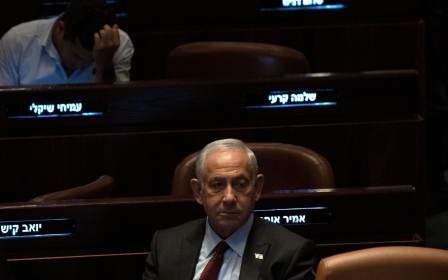Israel: Pro-settler minister handed West Bank powers in 'de jure annexation'

Israel transferred large sections of the occupied West Bank's administration from the military to a far-right cabinet minister on Thursday, in a move experts say amounts to "de jure annexation".
The transfer was agreed between Prime Minister Benjamin Netanyahu, Defence Minister Yoav Gallant and Finance Minister Bezalel Smotrich.
Under the deal, Smotrich - who also serves as a minister in the defence department - will have broad authority over civilian issues in the occupied West Bank.
These include powers over unlicensed settler outposts, settlement planning and construction, and authority to appoint officials in the Civil Administration - Israel's governing body in the West Bank.
It would mean a move from Israeli military governance, which has been the norm since Israel occupied the West Bank in 1967, to civilian political administration. Israel has never formally annexed the West Bank, and even if it did, its status would nonetheless remain defined by international law as a "temporary military occupation".
New MEE newsletter: Jerusalem Dispatch
Sign up to get the latest insights and analysis on Israel-Palestine, alongside Turkey Unpacked and other MEE newsletters
'It is a radical change of the governance of the West Bank and the occupied Palestinian territories in general'
- Michael Sfard, human rights lawyer
The agreement could allow Smotrich - himself a settler and longstanding proponent of West Bank annexation - to significantly ramp up settlement construction, increase Israel's presence in the West Bank and thwart Palestinian development.
More than 600,000 settlers live in over 200 East Jerusalem and West Bank settlements, in breach of international law.
The far-right minister has argued fiercely for these powers to be handed to him as part of his role in the ruling coalition led by Netanyahu.
Israeli human rights lawyer Michael Sfard said the transfer effectively makes Smotrich the "governor of the West Bank" and, if implemented, would amount to the "de jure annexation" of the occupied territory. De jure is a legal term that describes a practice that is legally recognised, whether it is taking place in reality or not.
"It is a radical change of the governance of the West Bank and the occupied Palestinian territories in general," Sfard told Middle East Eye. "The Israeli government will now directly maintain administrative powers over the occupied territories. The officials who have those powers will be appointed by Smotrich, the new governor of the West Bank, and to a large extent the military commander will be bypassed."
The widespread transfer of powers to a civilian Israeli government was, Sfard said, "a manifestation of Israeli sovereignty beyond the green line", the border separating pre-1967 Israel from the occupied Palestinian territories.
"It is a deepening of apartheid that brings Israel further into conflict with international law, as there is a prohibition on buying sovereignty with force."
'Jewish supremacy over all Palestinians'
The move was celebrated by Smotrich and settler groups in Israel, and condemned by the Palestinian Authority.
"Formal annexation, which the international community has consistently considered a red line, has been crossed," Wesam Ahmad, a Palestinian human rights advocate at Al-Haq, told MEE. "Unfortunately, the response has been mostly silence. What message does this send to Israel and what message does it send to the Palestinian people?"
Ahmad said that the "sense on the ground is that no matter how many words of condemnation, the international community will not take the necessary steps to hold Israel accountable. The message that sends is we cannot rely on international law to protect us because there is no political will to enforce it."
'[The deal] removes the legal smokescreen of "temporary military occupation" that has hitherto obfuscated Zionist expansionism'
- Nimer Sultany, law lecturer
Naomi Linder Kahn, a director of the Israeli pro-settler, right-wing advocacy group Regavim, heralded the move as a "very good step in the right direction".
"We have been calling for the dismantling of the administration in the West Bank for years," Kahn told MEE.
Kahn said that her group's vision "involves complete Israeli civilian authority over Area C, not more, not less". Area C covers about 60 percent of the West Bank and is administered by Israel.
"The situation is unprecedented anywhere in the world," Khan said. "We are talking about making life normal for people living there. The administration's mandate was to keep a lid on things, but that's not proper government."
Nimer Sultany, a Palestinian reader in public law at SOAS University of London, said the move works to "deepen the process of colonisation of Palestine.
"It removes the legal smokescreen of 'temporary military occupation' that has hitherto obfuscated Zionist expansionism," he told MEE.
Sultany said that even before the agreement, it was "no longer credible to assess Israel's regime of Jewish supremacy through the prism of the international law of occupation because it presumes that the longest military occupation since World War Two is 'temporary'".
He added that while the West Bank agreement was not the equivalent of the annexation of Jerusalem or the Golan Heights, the distinction is "insignificant when judged from the perspective of the actual real-world impact on the Palestinians. The West Bank settlers who sit on the Supreme Court, in the parliament and in government are seeking to consolidate Jewish supremacy over all Palestinians."
This article is available in French on Middle East Eye French edition.
Middle East Eye delivers independent and unrivalled coverage and analysis of the Middle East, North Africa and beyond. To learn more about republishing this content and the associated fees, please fill out this form. More about MEE can be found here.




